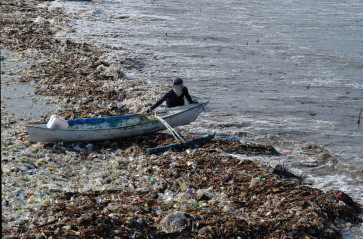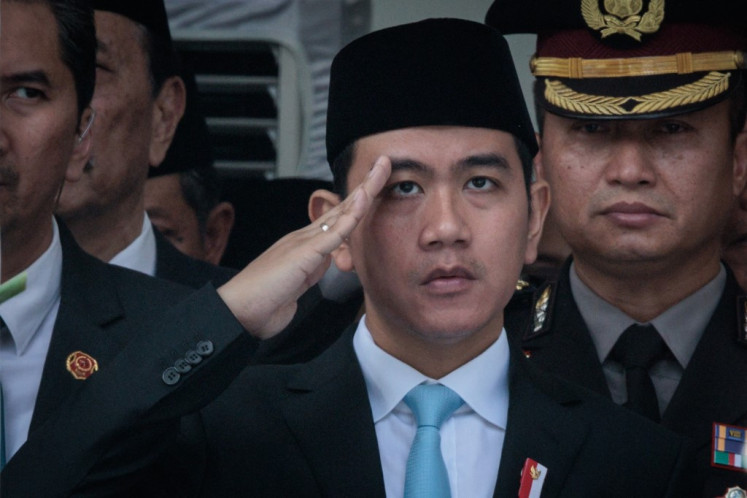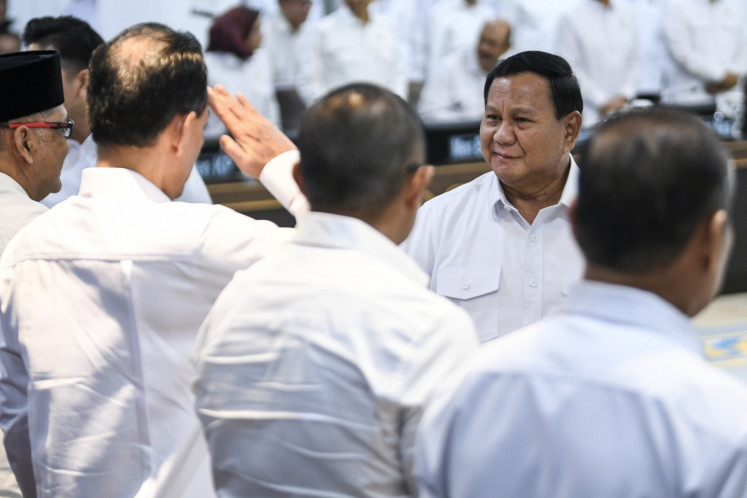Popular Reads
Top Results
Can't find what you're looking for?
View all search resultsPopular Reads
Top Results
Can't find what you're looking for?
View all search resultsThe fourth wave of democratization
During the last four months, the attention of the international community has been focused on political upheavals in North Africa and Middle East countries
Change text size
Gift Premium Articles
to Anyone
D
uring the last four months, the attention of the international community has been focused on political upheavals in North Africa and Middle East countries. It was started by the Jasmine revolution in Tunisia, populist anger in Egypt, followed by other nations in the regions.
After days of political uprisings, Tunisia and Egypt had been able to overcome the first phase of the crisis. The presidents of those countries were toppled by popular revolt. The two countries are now entering a crucial phase of general elections.
Other countries in the regions such as Yemen, Libya and Syria have been struggling to maintain
the status-quo by paying a high price in which many people have been killed.
The political uprisings in the region of North Africa and the Middle East were driven by at least two factors. First, the people in general were upset with the long-standing dictatorships. They demanded regime change. Second, they were keen to install democratic principles in their homelands, in particular individual freedoms and fair elections.
The idea of regime change is a manifestation of people’s frustration with the authoritarian regimes. President Zine el Abidine Ben Ali had been in power for 23 years, and President Hosni Mubarak for 29 years.
The idea of upholding democracy is actually an antithesis of the existing corrupt and repressive governments. The social conditions such as poverty and social injustice have become triggers for political unrest.
From an institutional perspective, regime change happened because the old structures of government had having provided enough space to adapt themselves to the new dynamics of democracy. The old structures of power diametrically opposed the current values of democracy. When people demanded individual freedoms and fair elections, the authoritarian regimes were invariably against it.
Any regime changes affect the process of democratization in a particular country. Regime change theoretically opens a window of opportunity for democratization. However, the breakdown of an authoritarian regime does not always lead to a democratic outcome. If a country cannot materialize regime change then democracy will be only a dream.
So far, the current governments of Yemen, Libya and Syria have been successful in maintaining their power. In such situations, the military’s role in maintaining power is of paramount importance. In many developing countries when the military or the security apparatus supported the government then it became difficult for the opposition to bring about a regime change. To the contrary, if the military supports the opposition there are opportunities for the opposition to establish a new government.
Tunisia and Egypt are now in the process of democratic transition. The resignations of President Ben Ali and President Mubarak have paved the way toward democratic transition.
In the meantime, the opposition parties in Yemen, Libya and Syria are still struggling to change the respective regimes before entering the phase of democratic transition.
If we use the theory of Samuel P. Huntington (The Third Wave, 1991), the current phenomena in North Africa and the Middle East might be classified as the fourth wave of democratization.
In Huntington’s view, the first wave lasted for a century from about 1828 and saw some 33 countries establish “at least minimal national democratic institutions”. This wave had its roots in the American and French revolutions.
Huntington’s second wave of democratization began in 1943 and lasted until about 1962 and embraced many of the countries liberated at the end of the Second World War.
The third wave of democratization began in Portugal and Greece in 1974 and expanded to include Spain, Latin America, the former Soviet Union and East and Southeast Asia. The breakdown of the Soviet Union in 1991 symbolized the end of the third wave of democratization.
The fourth wave of democratization in North Africa and the Middle East was driven particularly by the younger generation who are familiar with information technology such us Twitter and Facebook. It is estimated that 60 percent of the total population in the regions are young people under the age of 30.
After changing regimes, the success of democratization then depends upon the ability of elites in respective countries to resolve the existing problems during the period of transition and consolidation of democracy. It is important to note that during these periods economic growth and welfare should be sustained to cultivate democracy.
There is a positive correlation between economic development and democracy. In Seymour Martin Lipset’s words, “the more well-to-do a nation, the greater the chances that it will sustain democracy”. (Some Social Requisites of Democracy, 1959).
If countries in North Africa and the Middle East fail to manage the transition and consolidation of democracy following political uprisings, as history teaches us, there is a possibility of a reverse wave emerging which will threaten democracy. Whether or not Tunisia and Egypt are able to become democratic states, we’ll just have to wait and see.
The writer is Indonesian Ambassador to New Zealand, Samoa and Tonga. He is currently preparing a book, The Dynamics of Democratization in Developing Countries. This article represents the writer’s personal view.










